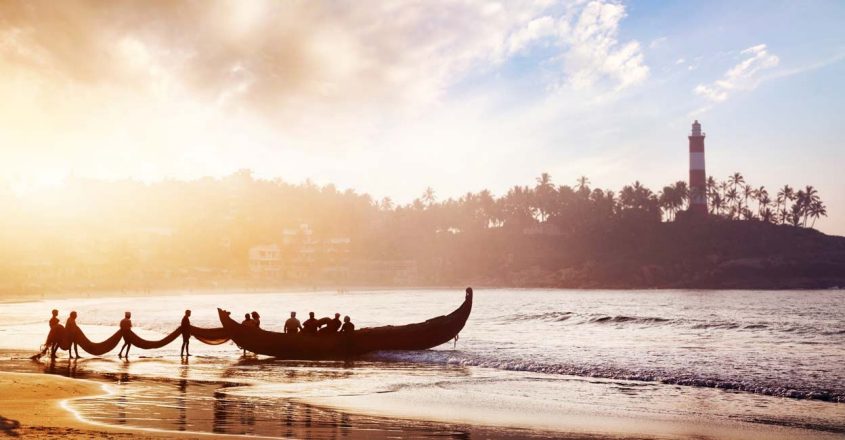KERALA :

Forgotten amidst waves of bad news, including geopolitical conflicts, environmental disasters and the global pandemic, is the humanitarian crisis caused by a civil war that began in 2014 in the fabled country of Yemen. For several centuries, the southern Arab country was a bridge between Kerala and lands to the west such as West Asia, Africa and Europe.
It was enterprising merchants from modern-day Yemen who began to make use of the monsoon winds to come to Muziris. The word monsoon comes from the Arabic mawsim, which means season. These businessmen lived a pretty globalised lifestyle by splitting their time between the Malabar Coast and southern Arabia at a time when there were no identity cards, passports, visas or even a concept of a nation-state. Some of these Arabs chose to settle down in the Malabar Coast and marry local women.
In a paper for the Indian History Congress in 1976, noted historian S M Mohamed Koya was able to trace the origins of the Malabar Muslim community.
“Some of these Arabs may have come from Hijaz, Oman and Bahrain. However, they were chiefly businessmen from Yemen and Hadramaut and many .Mappila families, particularly those known as ‘tangal’ families trace their origin to this area,” Mohamed wrote.
Interestingly enough, at the time of their migration to India, these merchants probably spoke Hadramautic, a language that belongs to the Old South Arabian subgroup of Semitic. “A large number of Mappila families find their origin in the interior Hadramaut town of Tarim, a wealthy town dominated by Sayyids which was once the intellectual and religious centre of Hadramaut,” Mohamed, who was a professor at the University of Calicut for decades, added.
In the paper, Mohamed stressed the fact that the traders started coming to India well before the advent of Islam, but their presence and established relations with the people of Malabar helped spread the religion in Kerala. “As pre-Islamic traders, the Arabs provided a friendly situation that facilitated the introduction of Islam and as Muslims, they introduced the faith,” he wrote.
Ponnani’s Makhdum family
Ponnani, a historic town that was once a major trading port, is also linked to Yemen. The town, at the peak of its glory, was home to the revered Makhdum family of Islamic theologians. Under Zain-ud-Din Makhdum and his grandson Zain ud-Din Makhdum II, Ponnani became a major centre of Islamic studies and is believed to have attracted students from Java, Sumatra, the Malay Peninsula and Ceylon.
It was also in this coastal town that the Arabi Malayalam or Ponnani script was invented. Since only 28 letters of Arabic orthography were available for 53 phonemes of Malayalam, additional letters established for Persian were used for this script.
Several old Mappila folk songs and works of literature were written in the Ponnani script, which stayed popular among Kerala’s Muslim community until the middle of the 20th century.
It has been on the wane since Indian independence and is taught mainly in a few madrassas in northern Kerala and the Lakshadweep Islands. There is no clear evidence though that this script has a Yemeni connection, but it was the script of choice for the Makdhum theologians.
This brilliant article by Kozhikode-based journalist Nijeesh Narayanan provides insights into the script, which is now in serious peril.
Zain ud-Din Makhdum II’s Tuhfat Ul Mujahideen chronicles the struggles between the people of the Malabar Coast and the colonial Portuguese. The book, originally written in the Ponnani script, describes the fierce resistance put up by the Kunjali Marakkar’s navy along with the Zamorin of Calicut against the Portuguese.
Culinary and cultural impact
There is little doubt that Yemeni elements have given an extra layer of depth to Kerala cuisine. Meen Pathiri and Irachi Pathiri are the results of Malayali and southern Arabic cuisine coming together.
Another dish that found its way from Hadraumat in Yemen to Kerala is Mandi or the famous Malabar Biriyani. Interestingly enough, the Yemeni version of the dish is usually made with chicken or lamb, and not with beef. If the Yemenis did bring Saltah, their delectable stew and the national dish, to Kerala, it did not manage to survive in its original form in the state, although many Malabari families have their own variations with different names.
Professor Mohamed in his paper wrote about how the mingling of the Yemeni immigrants with Malayalis has enriched the society of Kerala. He wrote, “Culturally the Malayalis were as far removed from the Arabs as the high topical scenery of Kerala is removed from the austere landscape of Arabia. But once wedded, the offspring of that union, the Mappilas have remained loyal to both parents.”
Before Yemen slipped into its latest civil war, there was a small and vibrant Malayali community in the country. One can only hope that the geopolitical puppet masters that have brought so much misery to the country allow it to once again live in peace. It is only when peace returns to the country that its millennia-old links to Kerala can be traced and re-established.
(The writer is the author of ‘Globetrotting for Love and Other Stories from Sakhalin Island’ and ‘A Week in the Life of Svitlana’).
source: http://www.onmanorama.com / OnManorama / Home> Lifestyle> Column / by Ajay Kamalakaran / June 28th, 2021








